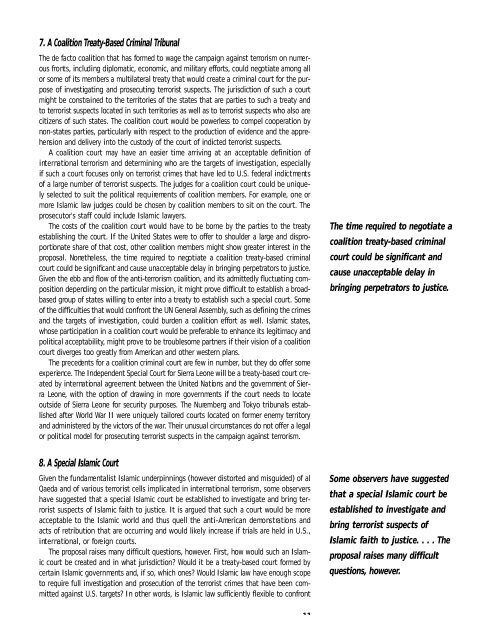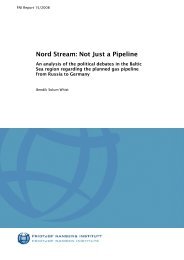David Scheffer Options for Pro secuting International Te r ro rists B ...
David Scheffer Options for Pro secuting International Te r ro rists B ...
David Scheffer Options for Pro secuting International Te r ro rists B ...
Create successful ePaper yourself
Turn your PDF publications into a flip-book with our unique Google optimized e-Paper software.
7. A Coalition Treaty-Based Criminal Tr i b u n a l<br />
T he de facto coalition that has fo r med to wage the campaign against ter<strong>ro</strong>rism on nu me <strong>ro</strong>us<br />
f<strong>ro</strong> nt s, inc l ud i ng diploma t ic, econo m ic, and military effo r t s, could ne go t iate amo ng all<br />
or some of its members a mu l t i l a t e ral treaty that would create a criminal court <st<strong>ro</strong>ng>for</st<strong>ro</strong>ng> the purpose<br />
of investig a t i ng and p<strong>ro</strong> s e c u t i ng ter<strong>ro</strong>rist suspects. The jurisdic t ion of such a court<br />
m ig ht be cons t ra i ned to the territories of the states that are parties to such a treaty and<br />
to ter<strong>ro</strong>rist suspects located in such territories as well as to ter<strong>ro</strong>rist suspects who also are<br />
c i t i z e ns of such states. The coalition court would be powerless to compel coopera t ion by<br />
non-states partie s, particularly with respect to the p<strong>ro</strong> duc t ion of evide nce and the apprehe<br />
ns ion and delivery into the custody of the court of ind icted ter<strong>ro</strong>rist suspects.<br />
A coalition court may have an easier time arriving at an acceptable de f i n i t ion of<br />
i nt e r na t io nal ter<strong>ro</strong>rism and de t e r m i n i ng who are the targets of investig a t ion, especia l l y<br />
if such a court focuses only on ter<strong>ro</strong>rist crimes that have led to U.S. fede ral ind ic t me nt s<br />
of a large number of ter<strong>ro</strong>rist suspects. The judges <st<strong>ro</strong>ng>for</st<strong>ro</strong>ng> a coalition court could be uniquely<br />
selected to suit the political re q u i re me nts of coalition me m b e r s. For exa m p l e, one or<br />
mo re Is l a m ic law judges could be chosen by coalition members to sit on the court. The<br />
p <strong>ro</strong>secutor’s staff could inc l ude Is l a m ic lawyers.<br />
T he costs of the coalition court would have to be borne by the parties to the tre a t y<br />
e s t a b l i s h i ng the court. If the United States were to offer to sho u l der a large and disp<strong>ro</strong>p<br />
o r t io nate share of that cost, other coalition members mig ht show greater int e rest in the<br />
p <strong>ro</strong>posal. No ne t he l e s s, the time re q u i red to ne go t iate a coalition treaty-based crimina l<br />
court could be sig n i f ic a nt and cause unacceptable delay in bring i ng perpetrators to justic e.<br />
Given the ebb and flow of the ant i - t e r <strong>ro</strong>rism coalition, and its admittedly fluc t ua t i ng comp<br />
o s i t ion de p e nd i ng on the particular mission, it mig ht p<strong>ro</strong>ve difficult to establish a b<strong>ro</strong> a d -<br />
based g<strong>ro</strong>up of states willing to enter into a treaty to establish such a special court. Some<br />
of the diffic u l t ies that would conf<strong>ro</strong> nt the UN Gene ral As s e m b l y, such as de f i n i ng the crime s<br />
a nd the targets of investig a t ion, could burden a coalition ef<st<strong>ro</strong>ng>for</st<strong>ro</strong>ng>t as well. Is l a m ic states,<br />
w hose partic i p a t ion in a coalition court would be pre f e rable to enhance its legitimacy and<br />
p o l i t ical acceptability, mig ht p<strong>ro</strong>ve to be t<strong>ro</strong> u b l e s o me partners if their vision of a coalitio n<br />
court diverges too greatly f<strong>ro</strong>m Ame r ican and other western plans.<br />
T he pre c e de nts <st<strong>ro</strong>ng>for</st<strong>ro</strong>ng> a coalition criminal court are few in nu m b e r, but they do offer some<br />
ex p e r ie nc e. The Inde p e nde nt Special Court <st<strong>ro</strong>ng>for</st<strong>ro</strong>ng> Sie r ra Leone will be a treaty-based court created<br />
by int e r na t io nal agre e me nt between the United Na t io ns and the go v e r n me nt of Sie rra<br />
Leone, with the option of dra w i ng in mo re go v e r n me nts if the court needs to locate<br />
o u t s ide of Sie r ra Leone <st<strong>ro</strong>ng>for</st<strong>ro</strong>ng> security purposes. The Nu re m b e rg and Tokyo tribunals establ<br />
i s hed after World War II were uniquely tailored courts located on fo r mer ene my territory<br />
a nd adm i n i s t e red by the victors of the war. Their unu s ual circ u ms t a nces do not offer a legal<br />
or political mo del <st<strong>ro</strong>ng>for</st<strong>ro</strong>ng> p<strong>ro</strong> s e c u t i ng ter<strong>ro</strong>rist suspects in the campaign against ter<strong>ro</strong>rism.<br />
8. A Special Islamic Court<br />
Given the funda me ntalist Is l a m ic unde r p i n n i ngs (however distorted and misguided) of al<br />
Q a e da and of various ter<strong>ro</strong>rist cells implicated in int e r na t io nal ter<strong>ro</strong>rism, some observers<br />
have suggested that a special Is l a m ic court be established to investigate and bring ter<strong>ro</strong>rist<br />
suspects of Is l a m ic faith to justic e. It is argued that such a court would be mo re<br />
acceptable to the Is l a m ic world and thus quell the ant i - A me r ican de mo ns t ra t io ns and<br />
acts of re t r i b u t ion that are occurring and would likely inc rease if trials are held in U.S.,<br />
i nt e r na t io nal, or fo re ign courts.<br />
T he p<strong>ro</strong>posal raises ma ny difficult questio ns, ho w e v e r. First, how would such an Is l a mic<br />
court be created and in what jurisdic t ion? Would it be a treaty-based court fo r med by<br />
certain Is l a m ic go v e r n me nts and, if so, which ones? Would Is l a m ic law have enough scope<br />
to re q u i re full investig a t ion and p<strong>ro</strong> s e c u t ion of the ter<strong>ro</strong>rist crimes that have been committed<br />
against U.S. targets? In other word s, is Is l a m ic law suffic ie ntly flexible to conf<strong>ro</strong> nt<br />
1 1<br />
The time re q u i red to negotiate a<br />
coalition treaty-based criminal<br />
court could be significant and<br />
cause unacceptable delay in<br />
bringing perpetra tors to justice.<br />
Some observers have suggested<br />
that a special Islamic court be<br />
e s tablished to investigate and<br />
bring ter<strong>ro</strong>rist suspects of<br />
Islamic faith to justice. . . . The<br />
p <strong>ro</strong>posal raises many difficult<br />
q u e s t i o n s, howeve r.













